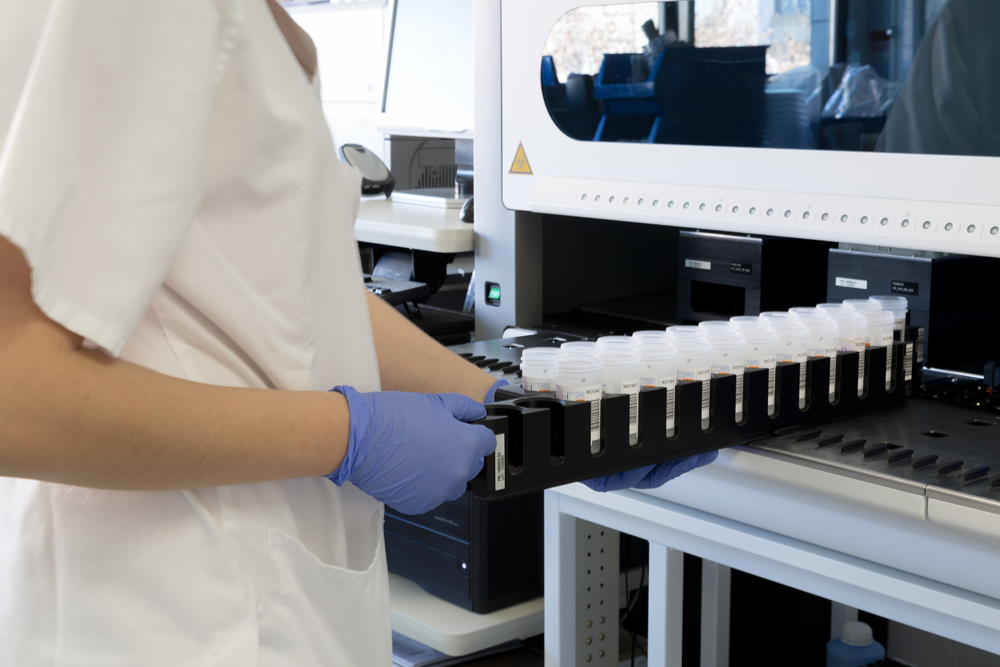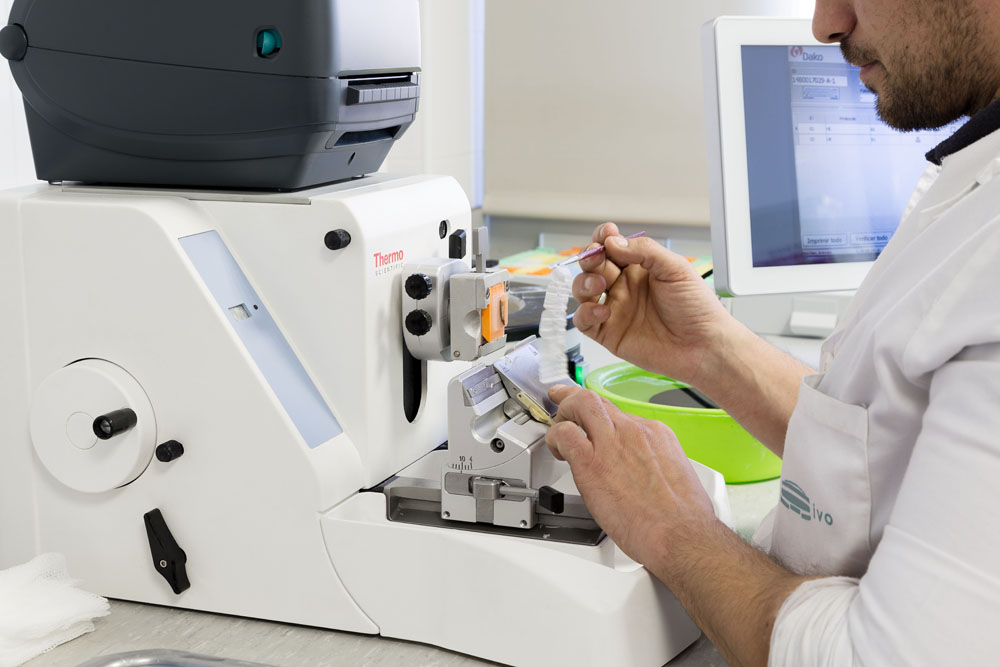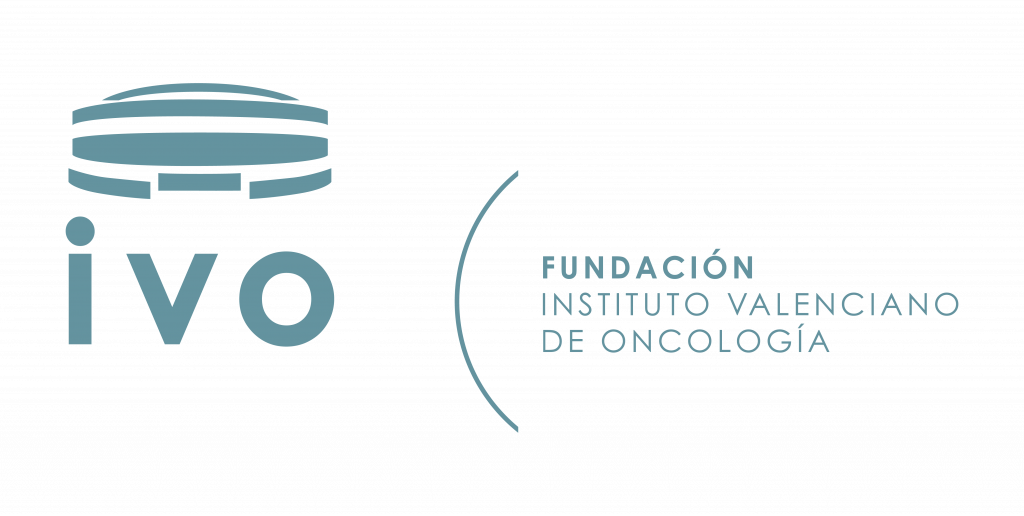What is a clinical trial?
A study to determine whether a new treatment, drug, device, or diagnostic or therapeutic technique will help prevent, detect or treat a disease by being applied to humans.
Clinical trials also help to find out whether or not these new treatments are safe and whether they are better than treatments that are currently available.

The entire process for the commercialisation of a new medicine takes about 10 years. During that time, the number of subjects/trials gradually increases.
Phases of a clinical trial
The development of new drugs goes through a process called clinical trials: research aimed at finding new drugs for the prevention and treatment of diseases, including cancer, as well as new diagnostic and surgical techniques.
After the pre-clinical phase (in order to obtain new chemical substances and experimenting with animals in the laboratory) and before marketing the drug, researchers test its efficacy, check its safety and analyse its results in comparison with those of previously available drugs.
Trials that compare the treatment under investigation with the established therapy are called “double-blind”. Neither the participants nor the researchers know who is receiving which treatment. This ensures objectivity.

- PHASE I
- PHASE II
- PHASE III
Tolerance and safety
This is the first step in human drug research. It is usually done on healthy volunteers, or patients when it comes to anti-cancer drugs, i.e. drugs that prevent or slow down cell division and are used in the treatment of cancer. They give us preliminary information on the safety and tolerability of these drugs.
Comparison of efficacy and safety with standard treatments
The sample size is extended to thousands of patients. Numerous researchers are involved to assess the efficacy of the new medicine. Adverse effects are analysed. The new drug is compared with standard treatment to confirm evidence of efficacy. This phase takes place prior to the authorisation and marketing of a drug.
Marketing and new indications
The drug is already on the market. Testing is carried out to monitor the long-term safety of the medicine and to analyse the results on the disease itself. New indications or dosages of the product are studied and compared with other known medicines.
Clinical trials carried out by the IVO
Description of clinical trials by speciality and tumour.
How to participate
Patients always sign an informed consent form stating that they agree to participate in the trial and that they have been given all the relevant information.
Patients are free to decide whether or not to participate in a clinical trial; they may only join one and they can leave at any time if they wish.
Clinical trials are regulated by law and require the approval of both the hospital’s Board and the Ethics Committee.
- COLON
Title: Phase IV multicentric clinical trial to evaluate the efficacy of hyperthermic intraperitoneal chemotherapy (HIPEC) with mytomicin-C after complete surgical cytoreduction in patients with colon cancer peritoneal metastases. CODE: GECOP-MMC
- HEAD AND NECK
- COLORECTAL
- SKIN
- ENDOMETRIUM
- GIST
- BREAST
- BREAST
- MELANOMA
- PROSTATE
- LUNG
- KIDNEY
- SOLID TUMOURS
- UROTHELIAL
- MISCELLANEOUS
Title: A phase III pivotal study of NBTXR3 activated by investigator’s choice of radiotherapy alone or radiotherapy in combination with cetuximab for platinum-based chemotherapy-ineligible elderly patients with locally advanced head and neck squamous cell carcinoma. CODE: NANORAY-312
Title: A phase 2, randomized, open-label, platform study using a master protocol to evaluate novel immunotherapy combinations as first-line treatment in participants with recurrent/metastatic PD-L1 positive squamous cell carcinoma of the head and neck. CODE: GSK 219885
Title: A phase 3, open-label, randomized study of perioperative dostarlimab monotherapy versus standard of care in participants with untreated T4N0 or stage III dMMR/MSI-H resectable colon cancer. CODE: 219606 _ AZUR-2
Title: A phase 1/2, open-label, multi-center study of ZN-c3 administered in combination with encorafenib and cetuximab in adults with metastatic colorectal cancer. CODE: Z0011001 (ZN-c3-016)
Title: Phase II trial of Pembrolizumab and Olaparib in homologous-recombination deficient (HRD) advanced colorectal cancer (CRC). CODE: PEMBROLA
Title: A phase 2, multicenter, multi arm, study to evaluate MK-1308A (co-formulated quavonlimab (MK-1308)/pembrolizumab) versus other treatments in participants with microsatellite instability-high (MSI-H) or mismatch repair deficient (dMMR) stage IV colorectal cancer. CODE: MK-1308A-008
Title: A randomized, placebo-controlled, double-blind study of adjuvant cemiplimab versus placebo after surgery and radiation therapy in patients with high risk cutaneous squamous cell carcinoma. CODE: R2810-ONC-1788
Title: A phase 2 exploratory, multicenter, open-label trial to determine the safety and preliminary clinical activity of GEN1046 in combination with anticancer agents in subjects with advanced endometrial cancer. CODE: GCT1046-05
Title: A phase 3, randomized, placebo-controlled, double-blind, multicenter trial of selinexor in maintenance therapy after systemic therapy for patients with p53 wild-type, advanced or recurrent endometrial carcinoma. CODE: XPORT-EC-042
Title: An international, phase 3, randomized, multicenter, open-label study of ripretinib vs sunitinib in patients with advanced GIST with kit exon 11 and co-occurring KIT exons 17 and/or 18 mutations who were previously treated with imatinib. CODE: DCC-2618-03-003
Title: Neoadjuvant and adjuvant ribociclib and endocrine therapy for clinically high-risk oestrogen receptor-positive (ER+) and HER2-negative (HER2-) breast cancer. CODE: SOLTI-1911 (RIBOLARIS)
Title: Chemotherapy-free pCR-guided strategy with subcutaneous trastuzumab-pertuzumab and T-DM1 in HER2-positive early breast cancer (PHERGAIN-2). CODE: MedOPP293_PHERGAIN-2
Title: Preoperative window of opportunity study with giredestrant (GDC-9545) or tamoxifen in premenopausal women with estrogen receptor-positive/human epidermal growth factor receptor 2-negative & Ki67≥10% early breast cancer. The EMPRESS study. CODE: MEDOPP459_Estudio EMPRESS
Title: Phase III postneoadjuvant study evaluating Sacituzumab Govitecan, an antibody drug conjugate in primary HER2-negative breast cancer patients with high relapse risk after standard neoadjuvant treatment – SASCIA. CODE: SASCIA _ GBG 102
Title: A phase III, open-label, multicentre, randomized trial of adjuvant palbociclib in combination with endocrine therapy versus endocrine therapy alone for patients with hormone receptor positive resected isolated locoregional recurrence of breast cancer. CODE: IBCSG 59-19 / BIG 18-02 (POLAR)
Title: A phase III, randomized, open-label, multicentre study evaluating the efficacy and safety of adjuvant Giredestrant compared with physician’s choice of adjuvant endocrine monotherapy in patients with oestrogen receptor-positive, HER2-negative early breast cancer. CODE: GO42784 (lidERA)
Title: A phase III, multicentre, open-label study of ribociclib versus palbociclib in patients with advanced hormone receptor-positive/HER2-negative/HER2-enriched breast cancer. (HARMONIA trial) CODE: SOLTI-2101_HARMONIA
Title: A phase III randomized, open-label study evaluating efficacy and safety of giredestrant compared with fulvestrant, both combined with a CDK4/6 inhibitor, in patients with estrogen receptor-positive, HER2-negative advanced breast cancer with resistance to prior adjuvant endocrine therapy. CODE: PionERA-CO44657
Title: A randomized, open-label, phase 3 study of sacituzumab govitecan versus treatment of physician’s choice in patients with hormone receptor-positive (HR+)/human epidermal growth factor receptor 2 negative (HER2-) (HER2 IHC0 or HER2-low [IHC 1+, IHC 2+/ISH-]) inoperable, locally advanced, or metastatic breast cancer and have received endocrine therapy. CODE: GS-US-598-6168 _ ASCENT-07
Title: A randomized, non-comparative, open-label, phase 1b/2 study of nadunolimab in combination with gemcitabine plus carboplatin in patients with advanced triple negative breast cancer (TRIFOUR Study). CODE: CAN04CLIN006
Title: An open label, randomized, multicenter study comparing the efficacy and safety of the combination of lasofoxifene and abemaciclib to the combination of fulvestrant and abemaciclib for the treatment of pre- and postmenopausal women and men with locally advanced or metastatic ER+/HER2- breast cancer with an ESR1 mutation. CODE: SMX 22-002 (Elaine 3)
Title: A randomized, double-blind, phase 3 study of tucatinib or placebo in combination with trastuzumab and pertuzumab as maintenance therapy for metastatic HER2+ breast cancer (HER2CLIMB-05). CODE: SGNTUC-028
Title: Multicentre open-label, phase II trial, to evaluate the efficacy and safety of nal-IRI for progressing brain metastases in patients with HER2-negative breast cancer. CODE: MedOPP107-
Title: Patients must have completed prior trastuzumab-based neoadjuvant/adjuvant therapy (e.g. trastuzumab-based therapies including trastuzumab-emantasine [T-DM1]). CODE: GEICAM/2018-06_DIANER
Title: Phase II study for PIK3CA/PTEN-altered advanced metaplastic breast cancer treated with MEN1611 monotherapy or in combination with eribulin. SABINA study. CODE: MEDOPP437_SABINA
Title: Study to evaluate the efect of metformin in the prevention of hyperglycemia in HR[+]/HER2[-] PIK3CA-mutation advanced breast cancer patients treated with alpelisib plus endocrine therapy. Metallica Study. CODE: METALLICA
Title: HER2-PREDICT: Translational study of tumour samples from the DS8201-A-U301 and DS8201-A-U302 trials. CODE: SOLTI-1804 (Her2Predict)
Title: A phase 3 trial of fianlimab (anti-LAG-3) and cemiplimab versus pembrolizumab in the adjuvant setting in patients with completely resected high-risk melanoma. CODE: R3767-ONC-2055
Title: A phase 3 trial of fianlimab (REGN3767, ANTI-LAG-3) + cemiplimab versus pembrolizumab in patients with previously untreated unresectable locally advanced or metastatic melanoma. CODE: R3767-ONC-2011
Title: A phase 3, randomized, open-label, study of subcutaneous nivolumab + relatlimab fixed-dose combination versus intravenous nivolumab + relatlimab fixed-dose combination in participants with previously untreated metastatic or unresectable melanoma. CODE: CA224-127 (RELATIVITY-127)
Title: An open-label, randomised, phase-i, multi-centre study to investigate the biological effects of saruparib (AZD5305) alone, darolutamide alone, and in combination given prior to radical prostatectomy in men with newly diagnosed prostate cancer (ASCERTAIN). CODE: D9721C00002 _ ASCERTAIN
Title: A phase 4, randomized, open-label, multicentre efficacy and safety study of standard dose of radium-223 dichloride vs. standard doses of novel anti-hormonal therapy (NAH) in patients with bone domi-dominant metastatic castration-resistant prostate cancer progressing during/after a line of NAH. CODE: BAY 88-8223 / 20510
Title: DORA trial: Phase III trial of docetaxel vs. docetaxel and radium-223 for metastatic castration-resistant prostate cancer (mCRPC). CODE: c16-174
Title: A phase 2, randomized, open-label, study of lorigerlimab with docetaxel or docetaxel alone in participants with metastatic castration-resistant prostate cancer. CODE: CP-MGD019-02
Title: A randomized, double-blind, international multicenter, phase III study to evaluate the anti-tumor efficacy and safety of HLX10 (recombinant humanized anti-PD-1 monoclonal antibody injection) or placebo in combination with chemotherapy (carboplatin/cisplatin-etoposide) and concurrent radiotherapy in patients with limited-stage small cell lung cancer (LS-SCLC). CODE: HLX10-020-SCLC302
Title: Phase 1b/2a safety and tolerability study of bemcentinib with pembrolizumab/carboplatin/pemetrexed in subjects with untreated advanced or metastatic non-squamous non-small cell lung cancer (NSCLC) without/with a STK11 mutation. CODE: BGBC016
Title: A phase 2, randomized, open-label, platform study utilizing a master protocol to evaluate novel immunotherapy combinations in participants with previously untreated, locally advanced/metastatic, programmed death ligand 1-selected non-small-cell lung cancer. CODE: 213824 _ Galaxy Lung _ 201
Title: A randomized, open-label, phase 3 study to evaluate Zimberelimab and Domvanalimab in combination with chemotherapy, versus pembrolizumab with chemotherapy for the first-line treatment of patients with metastatic non-small cell lung cancer with no epidermal growth factor receptor or anaplastic lymphoma kinase genomic tumour aberrations. STAR-121. CODE: GS-US-626-6216
Title: A randomized, open-label, phase 3 study of MK-2870 in combination with pembrolizumab compared to pembrolizumab monotherapy in the first-line treatment of participants with metastatic non-small cell lung cancer with PD-L1 TPS greater than or equal to 50%. CODE: MK-2870-007
Title: Subcutaneous methotrexate, oral dexamethasone or oral montelukast for the prevention of infusion related reaction associated with amivantamab, an EGFR-MET bispecific antibody, among post-osimertinib treated EGFRm NSCLC; SKIPPirr, a phase 2 study. CODE: 61186372NSC2005 _ SKIPPIRR
Title: Study to evaluate the overall survival of patients with extensive stage small cell lung cancer receiving trilaciclib or placebo prior to topotecan chemotherapy. CODE: G1T28-211
Title: A phase 2, multicenter, randomized, open-label trial of GEN1046 as monotherapy and in combination with anti-cancer therapy in subjects with relapsed/refractory metastatic non-small cell lung cancer after treatment with standard of care therapy with an immune checkpoint inhibitor. CODE: GCT1046-04
Title: A randomized, phase 3, open-label study to evaluate SGN-B6A compared with docetaxel in adult subjects with previously treated non-small cell lung cancer. CODE: SGNB6A-002
Title: A single-arm, open-label, multicentre phase 2 study to evaluate the efficacy and safety of taletrectinib in patients with advanced or metastatic ros1 positive NSCLC and other solid tumours. CODE: AB-106-G208
Title: Phase 1/2 dose escalation and expansion study evaluating MCLA-129, a human anti-EGFR and anti-c-MET bispecific antibody, in patients with advanced NSCLC and other solid tumours. CODE: MCLA-129-CL01
Title: A phase 1/2, open-label, multicentre, first-in-human study of the safety, tolerability, pharmacokinetics, and anti-tumour activity of TPX-0005 in patients with advanced solid tumours harbouring ALK, ROS1, or NTRK1-3 rearrangements (TRIDENT-1). CODE: TPX-0005-01 (TRIDENT-1)
Title: A multicentre, double-blind, randomized, phase 3 study to compare the efficacy and safety of belzutifan (MK-6482) plus pembrolizumab (MK-3475) versus placebo plus pembrolizumab, in the adjuvant treatment of clear cell renal cell carcinoma (CRcc) post nephrectomy (MK-6482-022). CODE: MK-6482-022
Title: A phase 1b, open-label study to evaluate the safety, tolerability, pharmacokinetics, immunogenicity, and antitumour activity of MEDI5752 in combination with axitinib in subjects with advanced renal cell carcinoma. CODE: D7980C00003 (MEDI5752)
Title: A randomized open-label phase 3 study of XL092 + nivolumab vs sunitinib in subjects with advanced or metastatic non-clear cell renal cell carcinoma. CODE: XL092-304
Title: A multicenter, open-label, phase I/II study of EOS884448 (EOS-448) in combination with standard of care and/or investigational therapies in participants with advanced solid tumors. CODE: TIG-006
Title: A first-in-human study of mutant-selective PI3Kα inhibitor, RLY-2608, as a single agent in advanced solid tumour patients and in combination with fulvestrant in patients with advanced breast cancer. CODE: RLY-2608-101
Title: A single-arm, open-label, multicentre phase 2 study to evaluate the efficacy and safety of taletrectinib in patients with advanced or metastatic ros1 positive NSCLC and other solid tumours. CODE: AB-106-G208
Title: Phase 1/2 dose escalation and expansion study evaluating MCLA-129, a human anti-EGFR and anti-c-MET bispecific antibody, in patients with advanced NSCLC and other solid tumours. CODE: MCLA-129-CL01
Title: A phase I, open-label, multicenter study of ZL-1218 as a single agent and as combination therapy with anti-PD-1 antibody to evaluate the safety, tolerability, and pharmacokinetics in subjects with advanced solid tumor malignancies. CODE: ZL-1218-001
Title: A phase 1/2 study of CPI-0209 in patients with advanced solid tumors and lymphomas. CODE: 0209-01_Constellation
Title: An open-label, phase I dose escalation and expansion trial to investigate safety and efficacy of BI 1821736 in patients with advanced solid tumors. CODE: 1467-0001
Title: A phase 1a/1b study of ELVN-002 for the treatment of patients with HER2 mutant non-small cell lung cancer. CODE: ELVN-OO2-001
Title: A multicenter, open-label phase 1/2 trial evaluating the safety, tolerability, and efficacy of MORAb-202, a folate receptor alpha (FRα)-targeting antibody-drug conjugate (ADC) in subjects with selected tumor types. CODE: MORAb-202-G000-201
Title: A phase II, open-label, multi-center, basket study of the ATR kinase inhibitor ART0380 administered orally as monotherapy to patients with biologically selected advanced or metastatic solid tumors (ARTIST). CODE: ART0380C004 _ PXL 276097
Title: An open label, phase 1, treatment study to evaluate the safety, pharmacokinetics and pharmacodynamics of IDE397 (MAT2A inhibitor) in adult participants with advanced solid tumors. CODE: IDE397-001
Title: Phase 1/2 multicentre study of the safety, pharmacokinetics, and preliminary efficacy of APL-101 in subjects with non-small cell lung cancer with c-Met EXON 14 skip mutations and c-Met dysregulation advanced solid tumours. CODE: Apollomics (APL-101-01)
Title: A phase 1/2, open-label, multicentre, first-in-human study of the safety, tolerability, pharmacokinetics, and anti-tumour activity of TPX-0005 in patients with advanced solid tumours harbouring ALK, ROS1, or NTRK1-3 rearrangements (TRIDENT-1). CODE: TPX-0005-01 (TRIDENT-1)
Title: Phase 1/2, open-label, dose escalation and dose expansion study of transcon TLR7/8 agonist alone or in combination with pembrolizumab in participants with locally advanced or metastatic solid tumor malignancies. CODE: TCTLR-101
Title: A phase 1 dose escalation and cohort expansion study of TSR-042, an anti-PD-1 monoclonal antibody, in patients with advanced solid tumours. CODE: 4010-01-001 (TSR-042) GARNET
Title: A Phase 2, open-label, multi-centre, multi-national interventional trial to evaluate the efficacy and safety of erdafitinib (ERDA) monotherapy and erdafitinib (ERDA) and cetrelimab (CET) combination as neoadjuvant treatment in cisplatin-ineligible patients with muscle-invasive bladder cancer (MIBC) whose tumours express FGFR gene alterations. CODE: SOGUG-2020-IEC(VEJ)-11 _ NEOWIN
Title: A phase III, double-blind, multicentre, randomized study of atezolizumab (Anti-PDL1 antibody) versus placebo as adjuvant therapy in patients with high-risk muscle-invasive bladder cancer who are ctDNA positive following cystectomy. CODE: BO42843 (IMVigor011)
Title: A randomized phase II study comparing 3 vs 6 cycles of platinum-based chemotherapy prior to maintenance avelumab in advanced urothelial cancer. CODE: DISCUS
Title: A phase 3, multi-center, randomized study evaluating efficacy of TAR-200 in combination with cetrelimab versus concurrent chemoradiotherapy in participants with muscle-invasive urothelial carcinoma (MIBC) of the bladder who are not receiving radical cystectomy. SunRISe-2. CODE: 17000139BLC3001_ SunRISe-2
Title: A multicentre, open-label, phase 3 study to evaluate the long-term safety and efficacy in participants who are currently on treatment or in follow-up in studies that include pembrolizumab. CODE: MK3475-587
Title: A multicentre, randomized, double-blind, parallel-group, placebo-controlled, phase 2 study to assess the efficacy and safety of ATX01 (topical amitriptyline hydrochloride 10% and 15% w/w) in comparison to placebo, in cancer survivor adult patients with chemotherapy-induced peripheral neuropathy (CIPN). CODE: ATX01-22-01-CIPN
Title: Efficacy of tislelizumab and spartalizumab across multiple cancer-types in patients with PD1-high mRNA expressing tumors defined by a single and pre-specified cutoff (ACROPOLI trial). CODE: SOLTI-1904 (ACROPOLI)
- BLADDER
- PROSTATE
Title: A randomized phase 3 study evaluating cystectomy with perioperative pembrolizumab versus cystectomy alone in participants who are cisplatin-ineligible or decline cisplatin with muscle-invasive bladder cancer (KEYNOTE-905). CODE: MK-3475-905
Title: Phase 2b clinical study evaluating efficacy and safety of tar-200 in combination with cetrelimab, TAR-200 alone, or cetrelimab alone in participants with high-risk non-muscle invasive bladder cancer (NMIBC) unresponsive to intravesical bacillus Calmette-Guérin (BCG) who are ineligible for or elected not to undergo radical cystectomy. CODE: 17000139BLC2001 _ SunRISe-1
Title: Multicentre clinical trial with a healthcare product associated with a drug in authorised therapeutic use for the treatment of NMIBC evaluating the efficacy and tolerability of adjuvant treatment with EMDA-MMC versus standard BCG, and the efficacy of the urinary biomarker MCM5 ADXBLADDER® in the detection of tumour recurrence in patients with High Grade NMIBC. CODE: CUETO 1801
Title: A phase III, single-arm study to evaluate the efficacy and safety of ONCOFID-P-B (paclitaxel-hyaluronic acid conjugate) administered intravesically to patients with BCG-unresponsive carcinoma in situ of the bladder with or without Ta-T1 papillary disease. CODE: R39_21_01
Title: A double-blind randomized phase III trial evaluating the efficacy of ADT +/- darolutamide in de novo metastatic prostate cancer patients with vulnerable functional ability and not elected for docetaxel or androgen receptor targeted agents. CODE: PEACE 6 – Vulnerable
Title: A randomized, double-blind, placebo-controlled phase 3 study of darolutamide plus androgen deprivation therapy (ADT) compared with placebo plus ADT in patients with high-risk biochemical recurrence (BCR) of prostate cancer. CODE: BAY 1841788 / 21492 _ ARASTEP
- SQUAMOUS CELL CARCINOMA
Title: A phase 4, multi-centre, randomized, evaluator-blinded, active-controlled study to determine the incidence of squamous cell carcinoma and evaluate the long-term safety of tirbanibulin 10 mg/g ointment and diclofenac sodium 3% gel for the treatment of adult patients with actinic keratosis on the face or scalp. CODE: M-14789-41. AKTIVE STUDY (ALM 1061)
Scientific studies
These are research projects that aim to evaluate a certain aspect or factor of a drug that affects the treatment of a group of patients.
The aim of these studies is to answer questions after observing the effects of authorised drugs or standard treatments in patients, taking into account their genetic characteristics.



